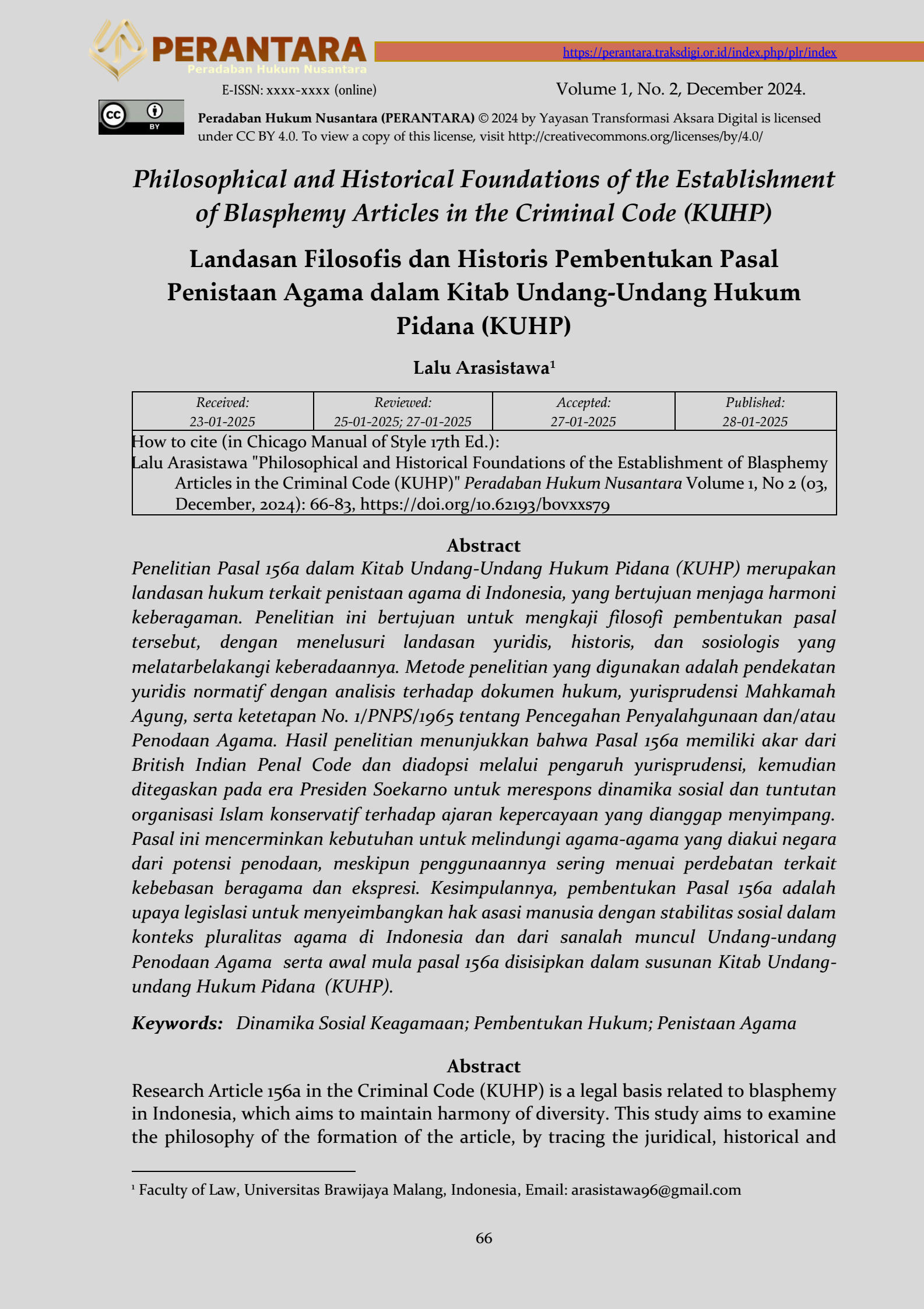Philosophical and Historical Foundations of the Establishment of Blasphemy Articles in the Criminal Code (KUHP)
Landasan Filosofis dan Historis Pembentukan Pasal Penistaan Agama dalam Kitab Undang-Undang Hukum Pidana (KUHP)
DOI:
https://doi.org/10.62193/h2vsk889Keywords:
Socio-religious Dynamics , Law Formation , Defamation of ReligionAbstract
Research Article 156a in the Criminal Code (KUHP) is a legal basis related to blasphemy in Indonesia, which aims to maintain harmony of diversity. This study aims to examine the philosophy of the formation of the article, by tracing the juridical, historical and sociological foundations behind its existence. The research method used is a normative juridical approach by analyzing legal documents, Supreme Court jurisprudence, and Decree No. 1/PNPS/1965 on the Prevention of Abuse and/or Blasphemy of Religion. The results show that Article 156a has roots in the British Indian Penal Code and was adopted through the influence of jurisprudence, then affirmed in the era of President Soekarno to respond to social dynamics and demands of conservative Islamic organizations against belief teachings that are considered deviant. The article reflects the need to protect state-recognized religions from potential blasphemy, although its use is often debated in relation to freedom of religion and expression. In conclusion, the establishment of Article 156a was a legislative effort to balance human rights with social stability in the context of religious plurality in Indonesia, from which emerged the blasphemy law and the beginning of Article 156a's inclusion in the composition of the Criminal Code (KUHP).
Downloads
References
Adji, Oemar Seno. Herziening-Ganti Rugi, Suap, Perkembangan Delik. Cetakan Kedua. Jakarta: Erlangga, 1984.
Amnesty International. “Indonesia: Prosecuting Beliefs: Indonesia’s Blasphemy Laws.”
Refworld,2014.https://www.refworld.org/reference/countryrep/amnesty/2014/en/102371.
Andriasari, Dian Dian. “Kritik Terhadap Penerapan Pasal 156a Kuhp Ditinjau Dari Perspektif Kehidupan Demokrasi Di Indonesia.” Veritas et Justitia 3, no. 2 (26 Desember 2017): 270–98. https://doi.org/10.25123/vej.v3i2.2688.
Arief, Barda Nawawi. Delik Agama dan Penghinaan Tuhan (Blasphemy) di Indonesia dan Perbandingan Berbagai Negara. Semarang: Badan Penerbit, Universitas Diponegoro, 2011.
Bielefeldt, Heiner. “Freedom of Religion or Belief—A Human Right under Pressure.” Oxford Journal of Law and Religion 1, no. 1 (1 April 2012): 15–35. https://doi.org/10.1093/ojlr/rwr018.
Christianto, Hwian. “Arti Pentiing Undang-Undang NO. 1/PNPS/1965 Bagi Kebebasan Beragama.” Jurnal Yudisial 6, no. 1 (11 Maret 2013): 1–16. https://doi.org/10.29123/jy.v6i1.115.
Lengkong, Lonna Yohanes, dan Tomson Situmeang. “Makna Delik Penodaan Agama Dalam Pasal 156a KUHP Dan Undang-Undang Nomor 1 Tahun 2023 Tentang KUHP.” JPPI (Jurnal Penelitian Pendidikan Indonesia) 9, no. 4 (1 Desember 2023): 118–26. https://doi.org/10.29210/020232682.
Makin, Al. “Not a Religious State: A study of three Indonesian religious leaders on the relation of state and religion.” Journal Indonesia and the Malay Word 46, no. 135 (4 Mei 2018): 95–116. https://doi.org/10.1080/13639811.2017.1380279.
Marzuki, Peter Mahmud. Penelitian Hukum, Jakarta, Kencana, 2011. Jakarta: Kencana, 2011.
Maula, Bani Syarif. “Religious Freedom in Indonesia: Between Upholding Constitutional Provisions and Complying with Social Considerations.” Journal of Indonesian Islam 7, no. 2 (1 Desember 2013): 383–403. https://doi.org/10.15642/JIIS.2013.7.2.383-403.
MD, Mahfud. Politik Hukum di Indonesia. Cetakan ke 5. Jakarta: Raja Grafindo Persada, 2012.
merdeka.com. “Kasus penistaan agama oleh Ahok hingga dibui 2 tahun.” merdeka.com, 30 Desember 2017. https://www.merdeka.com/peristiwa/kasus-penistaan-agama-oleh-ahok-hingga-dibui-2-tahun.html.
muidigital. “Pendapat dan Sikap Keagamaan MUI terkait Pernyataan Basuki Tjahaja Purnama.” Majelis Ulama Indonesia (blog), 20 Februari 2017. https://mirror.mui.or.id/berita/10590/pendapat-dan-sikap-keagamaan-mui-terkait-pernyataan-basuki-tjahaja-purnama/.
Prasetyo, Kresna Adi, dan Ridwan Arifin. “Analisis Hukum Pidana Mengenai Tindak Pidana Penistaan Agama Di Indonesia.” Gorontalo Law Review 2, no. 1 (30 April 2019): 1–12. https://doi.org/10.32662/golrev.v2i1.461.
Priyatno, Dwidja, Kristian, dan Ahmad Hunaeni Zulkarnaen. Delik Agama : dalam KUHP dan Rancangan KUHP Indonesia dan Telaah Perbandingan Hukum dengan KUHP Inggris, Belanda, Malaysia, Thailand, Singapura, Jerman, Prancis, Kanada, Latvia dan Finlandia. Bandung: Pustaka Reka Cipta, 2019.
Putsanra, Dipna Videlia. “Setara: Jumlah Kasus Penistaan Agama Membengkak Usai Reformasi.” tirto.id, 21 September 2018. https://tirto.id/setara-jumlah-kasus-penistaan-agama-membengkak-usai-reformasi-c1J6.
Republik Indonesia. “Pasal 22 ayat (1) Undang-Undang Nomor 39 Tahun 1999 tentang Hak Asasi Manusia (HAM) menyatakan bahwa setiap orang bebas memeluk agama dan beribadat menurut agamanya.,” 1999.
———. “Pasal 156a Kitab Undang-Undang Hukum Pidana (KUHP) mengatur tentang penodaan agama.,” 1965.
———. “Undang-Undang No. 1/PNPS/1965 tentang Pencegahan, Penyalahgunaan, dan/atau Penodaan Agama.,” 1965.
Soedarto. Hukum Pidana dan Perkembangan Masyarakat: Kajian terhadap Pembaharuan Hukum Pidana. Bandung: Sinar Baru, 1983.
Van Winkle, Andrew B. “Separation of Religion and State in Japan: A Pragmatic Interpretation of Article 20 and 89 of the Japanese Constitution.” Pacific Rim Law & Policy Journal Association 21, no. 2 (2012): 363.
https://heinonline.org/HOL/Page?handle=hein.journals/pacrimlp21&id=375&div=&collection=.
Yanti, Novi, Alya Nur, dan Anisatul Afifa. “Analisis Framing Pemberitaan Kasus Dugaan Penistaan Agama Ustadz Abdul Somad Dalam Kompas TV.” Communicology: Jurnal Ilmu Komunikasi 7, no. 2 (27 Desember 2019): 222–35. https://doi.org/10.21009/Communicology.012.08.
Yaqin, Lukman Ainul. “Makna Bahasa Hukum Frasa Penodaan Agama Dalam Pasal 156a KUHP.” PhD Thesis, Universitas 17 Agustus 1945 Surabaya, 2020. http://repository.untag-sby.ac.id/4626/.
Zainuddin, M. “Plurality of Religion: Future Challenges of Religion and Democracy in Indonesia.” Journal of Indonesian Islam 9, no. 2 (2015): 151–66. http://jiis.uinsby.ac.id/index.php/JIIs/article/view/217.

Downloads
Published
Issue
Section
License
Copyright (c) 2025 Lalu Arasistawa (Author)

This work is licensed under a Creative Commons Attribution 4.0 International License.
https://creativecommons.org/licenses/by/4.0















